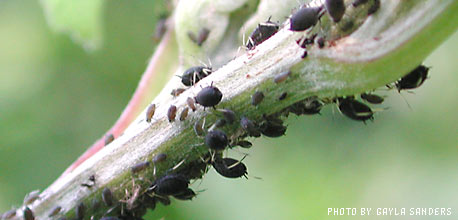
The reality of any kind of gardening is that at some point you WILL encounter pests. While there are hundreds of products lining the shelves of your local garden centre designed to erradicate bugs from the garden, you probably have ingredients in your own kitchen that will do an effective job without contaminating the foodchain or harming the environment.
Try these simple recipes the next time you find an unwanted creepy crawly making a meal of your future meal.
*Note: Before embarking on a bug killing tirade get to know the bugs in your garden. There are plenty of insects living in your mini ecosystem that are beneficial to preserving the sanctity of your space. Knowing which bugs are “good” and those that are “not-so-good” will aid you over the long run.
Smellerific Citrus Peel Spray
Use:
Soft bodied insects such as aphids, mites, and caterpillars.
You’ll Need:
- 4 cups of boiled water
- Chopped peel of 1 citrus fruit (orange or lemon)
- Thin strainer
- Funnel
- Spray bottle
Directions:
- Steep the chopped orange or lemon peel overnight in the boiling water.
- Strain your citrus brew through a thin-meshed strainer. Be sure to capture all the particles to avoid clogging your sprayer.
- Funnel the liquid into a spray bottle and use.
Non-Edible Variation:
Try adding 1 tsp dish soap or insecticidal soap (something without fragrances and additives is preferred) to the mix. Not only will it aid in the mix sticking to the insect, but will also do its own damage.
How to Use:
Be sure to test the sensitivity of your plant before launching a full-on assault. Some plants will burn when direct sprayed with citrus oil, especially in hot sun. Move your plant away from direct sun if possible and spray the underside of one leaf. Wait an hour or up to one day and then go ahead if foliar burning does not result.
For the spray to have maximum effect you must spray the insects directly as indirect contact may not be enough to kill the insect pests.
Why It Works:
Oils found in the peel of all citrus fruit act as a nerve poison that sends soft-bodied insects into a crazy fit upon contact. Of course anyone who has experienced citrus juice in the eye is also aware of this simple fact; it BURNS.
Bad Breath Pepper Garlic Spray
Use:
All Purpose. Try it on a host of insect pests.
You’ll Need:
- 4 cups of boiled water
- 1 entire bulb of garlic
- 1 smallish onion
- 1 tbsp hot pepper (flakes, powder or fresh)
- Thin strainer
- Funnel
- Spray bottle
Directions:
- Steep the all your ingredients overnight in the boiling water.
- Pour the whole mess into a blender or food processor and liquefy.
- Strain through cheesecloth or a thin-meshed strainer. Be sure to capture all the particles to avoid clogging your sprayer.
- Funnel the liquid into a spray bottle.
Non-Edible Variation:
Try adding 1 tsp dish soap or insecticidal soap (something without fragrances and additives is preferred) to the mix. Not only will it aid in the mix sticking to the insect, but will also do its own damage.
How to Use:
Thoroughly coat the leaves of the infected plant with the spray. Be sure to get the undersides and other nooks and crannys where bugs will hide. Store your mixture in the fridge to avoid the rotting smell that will eventually arise.
Why It Works:
Garlic contains a chemical that bugs don’t like. As an added bonus it also has fungicidal properties that may aid or prevent some diseases. The active ingredient in hot pepper is capsicum. This is the stuff that burns your eyes. Some rodents will also be repelled by hot peppers.